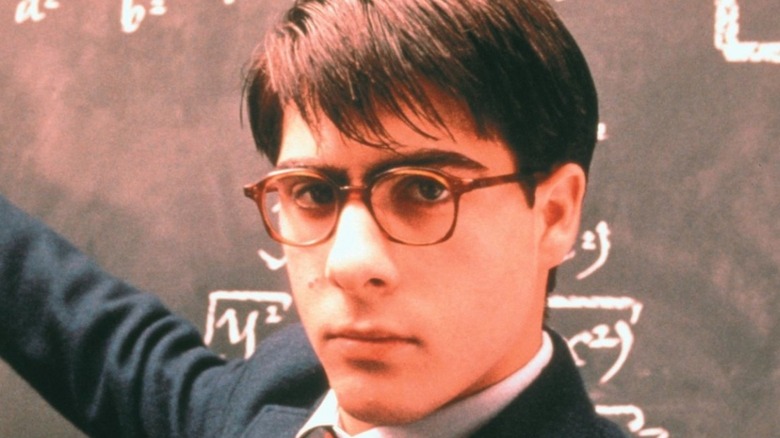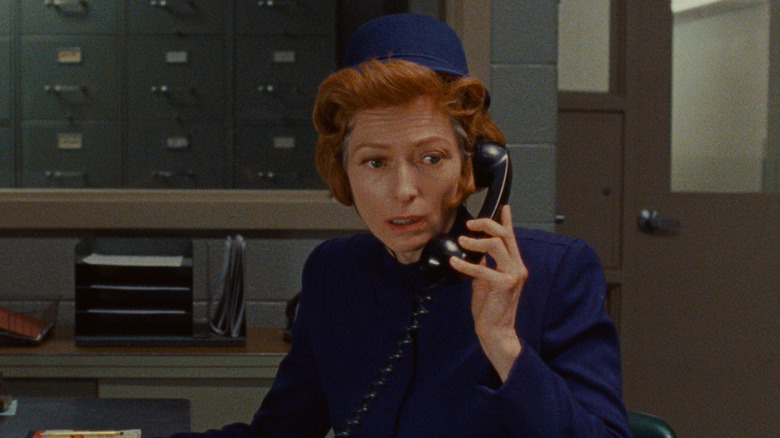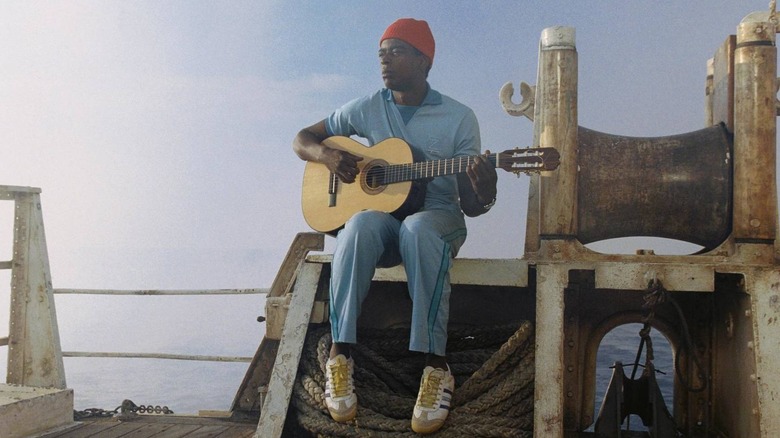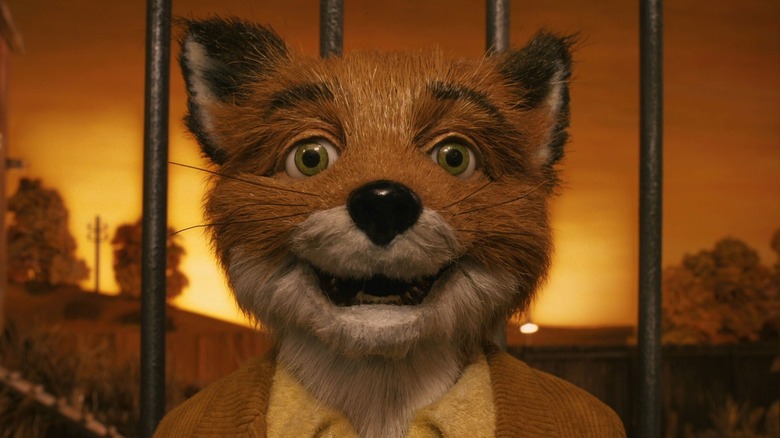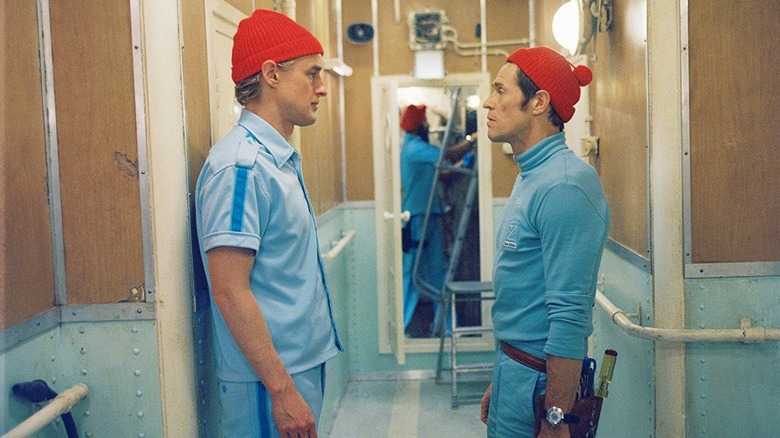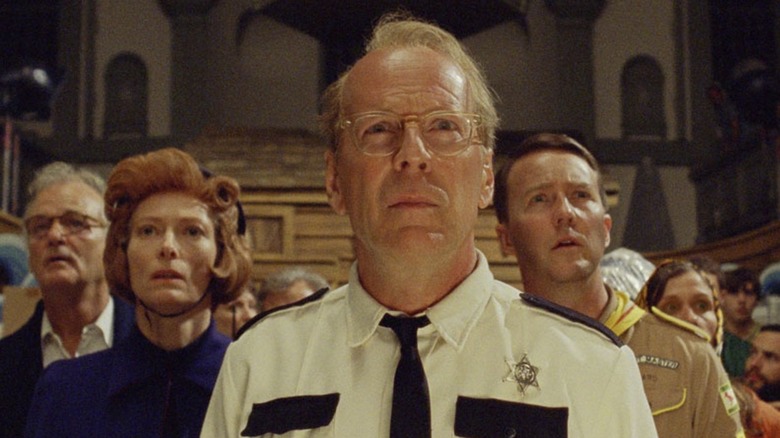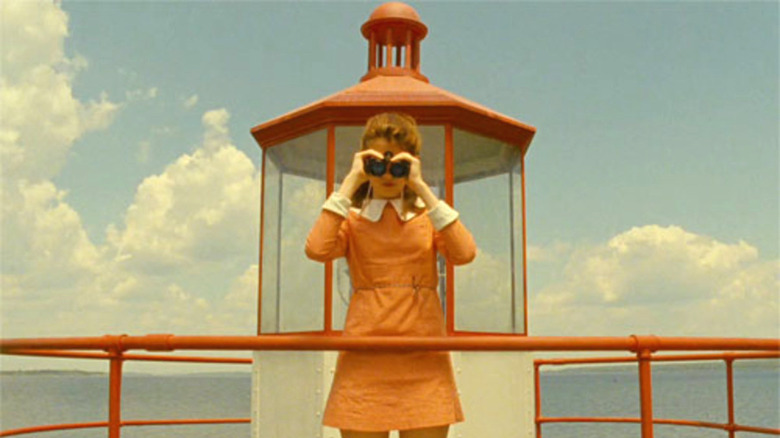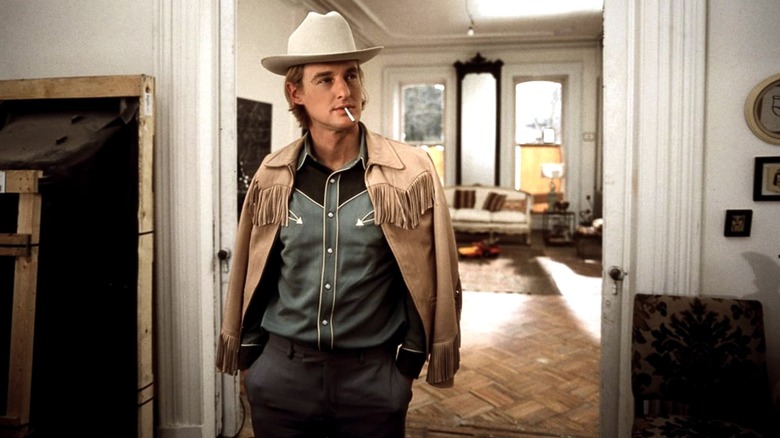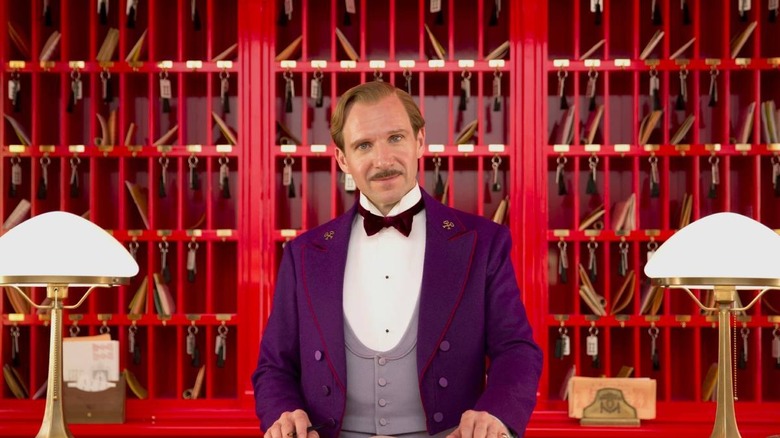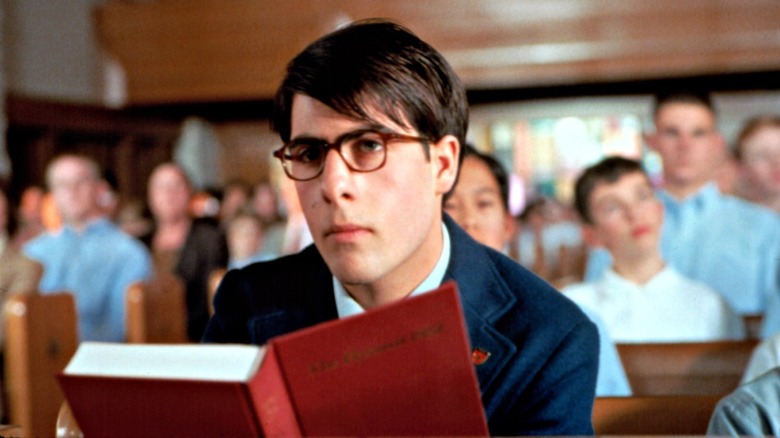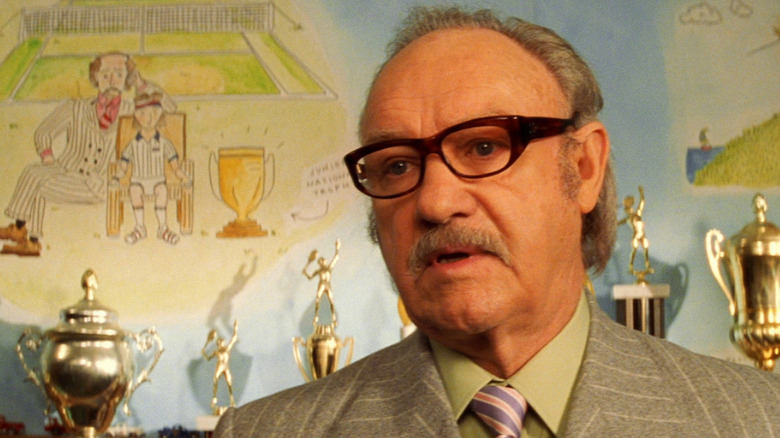The Top 10 Wes Anderson Characters Ranked
If you spend much time on Twitter, you've probably noticed an excited flurry of attention (not to mention a requisite meme or two) related to the Cannes film festival premiere of Wes Anderson's latest film, "The French Dispatch." Trailers and early reviews put it squarely in the director's formalist wheelhouse, complete with meticulously-crafted sets, dry humor and a sharp, colorful acting ensemble. Many members of the all-star cast come from Anderson's stable of tried-and-true creative partners. There are, however, some new additions like Elizabeth Moss, Timothée Chalamet, and Jeffrey Wright, who seems like such a natural fit for Anderson's hyper-literate style that it's a little surprising that he hasn't been in any of the director's other work before now.
With a new Anderson movie headed to theaters this fall, now's the time to revisit his other films and take stock of some of the great cinematic figures he's given us, as well as consider what makes an Anderson character "great" in the first place. There are a few unifying traits that make a top-notch Anderson personality, but it really all comes down to how each actor gives those characters life; there's a reason why Anderson likes working with the same people over and over again. Here are 10 Anderson characters, powered by some excellent performances, that stand out among the director's rogue's gallery.
10. Social Services — Moonrise Kingdom
2012's "Moonrise Kingdom" marks a turning point in Anderson's filmography. It's more earnest than his other work, a trend that continued with 2014's "The Grand Budapest Hotel." It also cemented his changing taste in composers, working for the second time with Alexandre Desplat, who's scored every film of his since "Fantastic Mr. Fox." Most importantly, however, "Moonrise Kingdom" is the movie in which Anderson started working with the inexhaustible chameleonic resource that is Tilda Swinton.
From her first phone call to the Island of New Penzance, where her threat to put troubled tween Sam (Jared Gilman) in an orphanage scares the pants off Bruce Willis and Edward Norton, Swinton's unnamed, no-nonsense social worker makes an immediate impression. Arriving on the island at the climax of the film, Swinton sweeps into the town's church-slash-storm shelter like a navy-blue Wicked Witch of the West. She's a perfect encapsulation of the movie's heightened perspective of childhood, especially kids' apprehensiveness toward authority figures. Intimidating, rule-oriented, and with no identity outside her job, she's less a person than a force of nature.
9. Pelé Dos Santos — The Life Aquatic with Steve Zissou
"The Life Aquatic" is a movie full of capital-P personalities, with one notable exception: Seu Jorge's Pelé Dos Santos. Pelé is an extremely chill (and, let's be honest, given the events of the film, kind of negligent) safety expert whose main contribution to the expedition is playing David Bowie covers on his acoustic guitar, which he sings in Portuguese.
Pelé doesn't have a ton going on in terms of an arc, but he lends a steady, calming, consistent presence to the film. Jorge's music also adds significantly to the film's tone and aesthetic, becoming, along with red knit hats, blue jumpsuits, and custom Adidas sneakers, one of its most memorable elements. Pelé is on this list because he's one of the most iconic parts of a movie that was destined to be endlessly quoted and immortalized as posters on the walls of countless film student dorm rooms.
8. Mr. Fox — Fantastic Mr. Fox
The first of Anderson's animated features, "Fantastic Mr. Fox" rests primarily on the shoulders of its charismatic, hapless titular lead character. The perpetually-scheming, endlessly charming Mr. Fox requires a performance that combines suaveness with a certain amount of misplaced confidence. There's nobody better suited to strike that balance than George Clooney, who combines elements of some his own most memorable characters into his voice work as Mr. Fox.
In Clooney's hands, this ambitious vulpine thief-turned-newspaperman has the planning skills of Danny Ocean, the improvisatory ability of "Out of Sight" lead Jack Foley, and the bluster of "O Brother, Where Art Thou?" protagonist Ulysses Everett McGill, with a dash of actual heroics thrown in as well. Like Mr. Fox's family and neighbors, we know that his plan to rob farmers Boggis, Bunce, and Bean is a dangerous and stupid one, but we're compelled to follow him through to the end anyway.
7. Klaus Daimler — The Life Aquatic with Steve Zissou
Klaus was Willem Dafoe's initial entry into the Wes Anderson cinematic universe, and the first of many memorable supporting performances. Of all of Dafoe and Anderson's collaborations, however, Klaus still stands out the most. He's a character perfectly suited to Anderson's sensibilities, and came before Anderson's characters' eccentricities started to feel a little predictable.
As with all of Anderson's films, it's the details that make "The Life Aquatic," moments where small choices or hinted-at backstories suggest a rich inner history that we're only seeing the surface of. Klaus is full of affectionate details, from the pom-pom on his standard-issue Team Zissou red stocking cap and his Werner Herzog-esque accent to his firm loyalty and his inferiority complex. Watching this stern-looking man with an absurdly cute hat break down his walls and get vulnerable over the course of the story is one of the greatest delights of "The Life Aquatic." Dafoe's surprising, funny performance showed mainstream audiences a lighter, more self-aware side to an actor better known for intense dramatic roles, and endeared him to a new generation of film fans.
6. Captain Sharp — Moonrise Kingdom
The best performances in an Anderson film (and therefore the ones that make the best characters) fall into two camps. In the first are actors who understand the assignment, and do their best to seamlessly blend with the director's idiosyncratic dialogue and visual presentation. The second camp is a rare and special one: actors who transcend the assignment, taking what's on the page and crafting a nuanced, realistic figure out of a sketch that could've easily become a cliché.
Bruce Willis, of all people, does the latter as Captain Sharp in "Moonrise Kingdom." As the lovelorn chief of police — or, more accurately, the whole police department — of New Penzance Island, Willis is tired, sincere, and practical. In a cast packed with heightened performances (case in point: Edward Norton's Scout Master Ward, who's so twee he almost becomes an Anderson self-parody), Willis' Captain Sharp is the character who feels the most like a real person. It's easy to imagine the character looking and sounding very different with someone else in this role. "Moonrise Kingdom" would've been poorer for it.
5. Suzy Bishop — Moonrise Kingdom
Together, Suzy Bishop and Sam Shakusky have become a treasured pop culture depiction of young lovers on the run. If you're between the ages of 25 to 40, chances are good you've encountered at least one Suzy-Sam couples Halloween costume. As much as I hate the thought of splitting them up, it's undeniable that Suzy is the stronger character of the two.
Sam is sweet, but Suzy has more interiority, and we get a greater sense of what her home life is like. She loves middle-grade fantasy novels (were it a real book, I'm sure I would absolutely devour "The Francine Odysseys") and French pop music. She struggles with her temper in a way that feels authentic to a kid's experience, even if the results are sometimes frightening. Kara Hayward's performance, like Willis', transcends the already stellar material. Her stylized-yet-grounded turn results in a character that's part Anna Karina in "Pierrot Le Fou" and part Matilda Wormwood.
4. Eli Cash — The Royal Tenenbaums
No list of great Anderson characters would really be complete without an Owen Wilson-based entry. Among Wilson's many memorable contributions to the director's oeuvre, there's likely no character more ironically beloved than macho novelist blowhard Eli Cash, the man who launched a thousand memes.
Supposedly inspired by western genre giant Cormac McCarthy and New York literary brat pack member Jay McInerney, Eli also feels more than a little indebted to Dennis Hopper in "The American Friend," with his cowboy hat, affinity for mescaline, and Tom Ripley-esque ability to insert himself into the lives of others — not to mention the outrageous drug-fueled stunts he pulls. Unlike Hopper's ruthless, unpredictable character, however, Eli is pathetic and insecure in a way that feels familiar and relatable. We all knew this guy in our college English classes. What this movie presupposes is, maybe he never grew up?
3. M. Gustave — The Grand Budapest Hotel
Anderson's films specialize in problematic father figures. Most of these characters are tired, amusingly misanthropic sad sacks — think Royal Tenenbaum, Steve Zissou, Herman Blume, or the previously mentioned Captain Sharp. "The Grand Budapest Hotel" star M. Gustave, however, is of a different caliber entirely. He easily meets and exceeds the profane linguistic heights of Royal, Steve, and their ilk.
More than that, Gustave has class. He's uniquely genteel, sensitive, and kind, not for show (though Ralph Fiennes imbues him with plenty of vanity), but because it's part of his instinctive inner code. Like any great hotel manager, Gustave has an intuitive sense for others' needs, both physical and emotional. He may be a peacock, but he's also a good friend in a tight spot, resourceful, honorable to the core, and the rare Anderson character whose outsized sense of self-importance actually feels earned.
2. Max Fischer — Rushmore
In addition to the facts that "Rushmore" was Anderson's breakthrough film and gave Jason Schwartzman his career, Max Fischer feels like an important reflection on the director's early work. "Rushmore" and "Bottle Rocket," Anderson's first film, are full of ambitious dreamers, people who hunger for infamy and a cool, rebellious reputation. More than anything else, though, they want to put on a show, and are determined to either succeed or go down in a blaze of glory. That attitude also feels like a statement about the process of making an independent film: lots of ambition, creative problem-solving, a few dedicated allies, and an ego that defies criticism.
Overachieving high-school theater impresario Max feels like the truest personification of these ideas. Max is the kind of kid who's so focused on staging a junior production of "Serpico" that he can't pass his classes. When he's kicked out of private school, he doesn't let it get him down, writing an original play about the Vietnam War to produce at his new school, complete with gunfire, miniature aircraft, and a flamethrower.
It's hard not to see Anderson, a director who clearly loves rich production design and a handmade aesthetic, identifying at least a little with Max. Futile teacher crushes and age-inappropriate friendships aside, Max is, more than anything, a determined artist with big ideas and a hell of an eye. His projects will live up to his demanding standards, resources (and safety) be damned.
1. Royal Tenenbaum — The Royal Tenenbaums
Of all of Anderson's flawed father figures, Royal Tenenbaum surely must be the greatest. Bill Murray's Herman Blume in "Rushmore" may be the ur-text, but Gene Hackman's patriarch remains the apex. He's also an example of a transcendent performance, able to break through Anderson's occasionally suffocating style tget to the emotional core of the character, wearing it on his sleeve rather than tamping it down.
That move makes Hackman's Royal feel like even more of an outsider to his estranged, closed-off family than he already is, and it highlights their emotional separation even more as he tries to reconnect with them. The rest of the Tenenbaums feel like well-drawn cartoons, or, at best, characters in a J.D. Salinger novel. Royal, with all his vices, voiced regrets, and obvious manipulation, actually feels like the grandpa or great-uncle you've been told to stay away from. Creating a top 10 list of any set of beloved characters, not least Anderson's, is always going to be a contentious proposition. It's hard to argue, however, with the undeniable fact that Royal has always been the best one.
